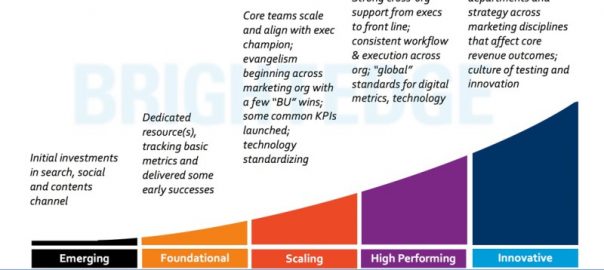DCoE isn’t just another trendy acronym. A Digital Center of Excellence is essential for your organization’s success, says columnist Jim Yu. He outlines three steps to help you build one.

Two-thirds of Global 2000 CEOs will have digital transformation at the center of their corporate strategies by the end of 2017, according to IDC.
CEOs and CMOs are increasingly becoming more accountable for driving maximum business impact from their digital marketing efforts, and building so-called “digital centers of excellence” is becoming key to organizational success and subsequent digital transformation.
A center of excellence (CoE) is a team, a shared facility or an entity that provides leadership, best practices, research, support and training for a focus area. In the digital marketing world, a Digital Center of Excellence (DCoE) helps remove the silos and barriers to communication that can thwart integrated digital marketing campaigns.
As organizations scale in size, smart CMOs are building Digital Centers of Excellence to support the customer journey and allow search, content and digital marketers to streamline creative, production and performance initiatives.
Below I identify three key steps based on the development of people, process and technology that CMOs should follow to build their Digital Center of Excellence.

People: investment in people
Finding, developing and retaining digital talent is the most important part of developing a DCoE. Thirty-one percent of respondents in a set of digital marketing surveys from Accenture stated that they are not satisfied with the skill sets of the employees in their digital organizations. Many of the organizations surveyed actually reported a preference for hiring new employees (44 percent) with the right skill sets over training existing employees (41 percent).
To pursue a thorough digital strategy, marketing departments must be made up of talented professionals who can fill both specialist and hybrid roles. It’s only through utilizing specialist and hybrid skill sets alongside agile mindsets that CMOs can create a fluid, global digital presence for their organization.
And it’s not just brands that need to make adjustments to their strategies; professionals themselves need to be able to adapt and master new roles, so they can help their organizations develop comprehensive digital solutions and strategies through the DCoE. This is such an important topic in the industry that we have dedicated a whole track to this subject matter at my company’s Share16 conference this year.
Key areas of CMO focus:
- Executive sponsorship
- Employee talent management
- Digital resource development
- Employee advocacy and engagement
- Training and digital marketing certification
Process: organizational redesign
Digital can be viewed as a very broad discipline, and digital marketing can mean different things for different organizations. With that in mind, it’s very important that CMOs ensure that the Digital Center of Excellence is:
- Centered around core organizational needs — business models and sales objectives
- Contains specialist sub-groups — such as digital creative, website development, SEM, content production, display, media buying, email and social media
Furthermore, it’s critical to focus on communication, process and training systems that operate within the centers of excellence. Different organizations use different governance models that can vary from informal to centralized to hybrid or independent. Digital governance mechanisms help the organization with project prioritization, definition of roles, responsibilities and accountabilities and establishment of policies and standards.
In today’s rapidly changing digital marketing ecosystem, centralizing digital marketing expertise in a COE removes the digital marketing silos and results in a leaner, flexible and more agile organization.
Key areas of CMO focus:
- Channel prioritization
- Cross-functional process and workflow
- Integrated digital strategy — digital labs
- Roles, responsibility and accountability
- Revenue-based KPIs and reporting
- Cross-functional attribution
Technology: optimizing the marketing technology stack
Foundation Capital expects that technology spend by CMOs will increase 10X in 10 years from $12 billion to $120 billion. Marketing technology and intelligence, utilized and implemented correctly, will have a massive impact on the CMO’s bottom line.
Many CMOs face the common challenge of navigating through a complex, fragmented and overcrowded technology landscape. A record 3,500 companies are now included in ChiefMartec’s latest Marketing Technology Landscape.
When building a marketing technology stack, it’s imperative that performance marketing technology is central to the stack; vendors that focus on production, automation and process must feed into analytical and reporting technology that moves the needle on digital performance.
Modern-day CMOs are now leveraging a powerful combination of the most effective and efficient technology to optimize for the customer journey. A key role of the DCoE is to test new technologies and build performance-based business models and revenue generation systems, adopt new marketing technologies and implement various integrated digital marketing activities.
Through the DCoE, the CMO can continuously feed the wider organization and board members useful data, analytics and intelligence.
Key areas of CMO focus:
- Tools and platform standardization
- Technology integration
- Data insights and intelligence
- Revenue reporting
Digital maturity modeling
Maturity modeling within a DCoE is a great way to benchmark digital marketing maturity and success in line with organizational growth. This includes gap analysis, industry trends, internal assessment and training, executive sponsorship and everything else related to the CMO’s digital transformation journey.

Digital Centers of Excellence consist of subject-matter experts, use methodologies and tools and platforms that enable shared learning and encourage the building of a digital performance-based team.
By promoting collaboration and using best practices to drive business results, organizations are digitally maturing and transforming. To truly transform your organization, a DCoE should act as an evangelist to drive digital marketing initiatives within a centralized and agile framework across the whole business.
Some opinions expressed in this article may be those of a guest author and not necessarily Marketing Land. Staff authors are listed here.
Marketing Land – Internet Marketing News, Strategies & Tips
(448)







